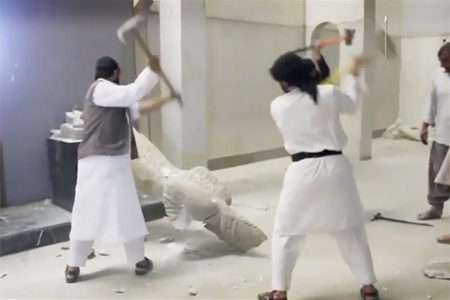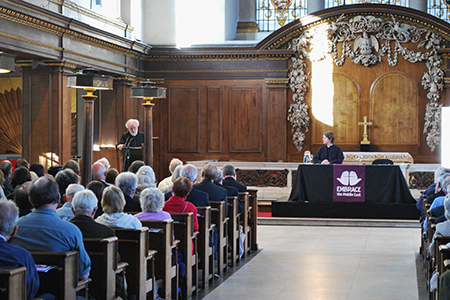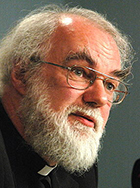| |
 |
 |
 |
| The story so far... |
 |
| You're currently on our features and projects pages, with material ranging from the satirical to the theological. For more features, click here. |
| |
|
|
 |
 |
 |
| Beware the warrior archaeologists |
 |
A church at the site where Jesus is said to have fed 5,000 people was torched this week – another in a long line of violent desecrations. Dr Rowan Williams, former Archbishop of Canterbury, in a recent lecture hosted by UK charity Embrace the Middle East, explains how "warrior archaeologists" are defacing records and stories in a systematic attempt to manipulate the past and use it as a weapon.
TWENTY YEARS AGO I stood in remains of a Byzantine city, Mamshit, in the Negev desert. Its street plan is almost perfectly preserved and in the middle is the ground plan of a basilica. A black plastic sheet covered the ground because the Byzantine mosaic uncovered there, at the heart of the church, had been smashed and defaced.
It's an embodied image of why archaeology is not just an academic affair. Here was an attempt to sanitise the story and deny somebody’s presence in history. It probably reflected Israeli extremist concern to airbrush Christian and Byzantine history from corporate memory.
But it's not simply a problem restricted to one kind of archaeological site. My title, "Warrior archaeologists", comes from a poem by James Fenton entitled "Jerusalem". The poem can be read here.
Attempts to sanitise and tidy up history have become once again very visible and violent. We've become accustomed to the sight of ISIS militants destroying archaeological remains in Syria and Iraq. Among others, Kalhu, Nineveh, Dur-Sharrukin and Assha have been looted and wrecked. The mosque of the prophet Younis, the traditional burial place of Jonah, and the mosque of the Prophet Jerjis in Mosul have been destroyed.
It's the work of "warrior archaeologists". All archaeologists come up with a story and there are no innocent stories – but the defacing of a record, a story, is a systematic attempt to rule out one way of telling the past.
The history of archaeology in the Holy Land is once again a rather more complex thing than we might first assume. Years ago, an heroic generation of archaeologists turned up what seemed to be convincing evidence of the historicity of Hebrew scripture. In the 60s and 70s, advances in archaeology were very often enterprises that walked hand-in-hand with a newly-confident Israeli state: the excavations of Masada were part of that consolidation of a deeply-threatened identity.

Archaeology notoriously and annoyingly doesn't stand still. The history of archaeology in the Holy Land has once again become a rather more complex thing than we might first assume.
Several scholars argue that what we have in Hebrew scripture, far from being an unambiguous historical record confirmed by archaeology, is something more like an historical novel composed by people creating their own past. In turn, that has been seized upon by those who believe that the entire Israeli state therefore rests upon a myth. Warrior archaeology. One way or another, no innocent discoveries, no innocent stories: literally, a ground of contest.
Behind all this there's a paradox: history is seen as the place where you get your "title deeds", where you can establish the ground, literally, on which you stand.
That can be used positively or negatively. Let's say, as some do, that there is no historical basis for Abraham, Moses or David. Does that then justify the triumphant conclusion that there is therefore no basis for the state of Israel in the Middle East today?
On the other hand does that mean, if you don't want to go down that line, that there is no important human reality between the epoch of Hebrew scripture and now?
History is a place where you look for your "title deeds" – as if rooting through the cabinet or sideboard after a family death, trying to find the will, deeds and papers that will establish claims in some imagined global law court.
At the same time, history can be a threat. As you rummage through the papers you may find evidence of a family history that you'd much rather suppress. It needs to be tidied up because, if you don't, it will come back and bite. History is the enemy of a simple story of legitimacy. Or to put it at its most extreme: history is at the same time sacred and yet always in need of sanitising.
That, of course, has quite a bit to do with what ISIS is up to. The title deeds that matter are those delivered in the Holy Qur’an. The title deeds – not of any state, any culture – but of Islam. History stops mattering at precisely the point where you are told what your rights and dignities are.
History, however, is also the unsettling question. That's the contradiction in human attitudes to the past in western Asia, the Middle East and the Holy Land, where history and soil are much more deeply intertwined, it seems, than almost anywhere else on the globe.
HOW DO WE RESPOND? What do we do? Let me start with two points about history itself. These are probably lucid, western and unhelpful, but I'm trying them for size.
The first thing is that history is always a history of conversation. Nobody's history is just their history. We cannot write a national history only about our community. There is no story just about us. To be who I am, I have to say something about the other, even the enemy. History is always conversational.
That means history is never any one group's possession. I don't own history. I own the story I tell about my community but I don't own history because there remain those uncomfortable loose ends where somebody else's story has impinged on mine and become part of it.
And that tells us issues of justice are never going to be settled simply by an appeal to the past. To look for justice in the title deeds of history is to court deep frustration. Justice is not an exact science of making up for the past. Justice is about the creation of sustainable, defensible, fruitful relationship here and now and for the future. And to learn what we can and can't properly expect from history is, I would say, part of growing up into understanding something more about justice.
We are not in the business of trying to settle historical scores. We are asking here and now: what is the cost and risk to actual human subjects and communities? How do we help create something that can be sustained and defended, that is fruitful and fair? If we want to go down any other route, we risk falling into the great fallacy that ISIS seems to live in: that history is something which can be moulded, manipulated and used as a weapon.
Justice begins with listening to the other’s history. It is the beginning of rediscovering the exchange that matters. The temptation is always to say: "If I let go of my history, including my history of other people doing terrible things to me, then I'm capitulating by betraying my ancestors. I'm giving way to your story, which is not mine".
But if we truly believe that all our history is an inter-weaving of difference, that we are formed by the other, by the stranger, and that my identity depends on yours, something else becomes possible.
That is why it seems to me that thinking about history in this context of "warrior archaeology" is deeply connected with how we think about security. My security and my neighbour's security belong together. Our temptation repeatedly in individual and corporate affairs is to say: my security means your weakness.
Israel's security will depend in the long run on the security, the justice, the peace of its environment, its region.
Likewise the long-term security, the well-being, the peace, of neighbouring countries depends on an Israel delivered from anxiety and reactivity. Surely we would have to say the same thing about the warring Islamic communities within Syria and Iraq.
My history, my identity, is bound up with yours. I can't be me if you're not you. I can't be secure without your security. And somewhere in the depths behind this lies that most fundamental of all Christian theological insights, the insight grounded in the life of the Body of Christ. Every member's suffering is everyone's issue. Anyone's failure is everyone's failure. Anyone's well-being is everyone's well-being.
WHAT THEN ARE OUR priorities going to be in engaging with the region and engaging with its people? The practical, social witness of our Christian brothers and sisters in the region, like those at Embrace the Middle East, needs prayer support because it stands for a past and a future: a past in which Christians and their neighbours have miraculously lived side-by-side for centuries with constructive exchange, and a future which can learn from that past – to work towards something other than the constant deadlock and constant standoff of warrior archaeology.
But for that to happen, we also need to ask: where are the spaces for people to listen to each other's history without being threatened or diminished by it? The contexts are often those of very small, vulnerable groups. The Bereaved Families Forum brings together people from Israeli and Palestinian communities who have lost loved ones to violence. They share an experience of almost unimaginable loss, and to speak face-to-face about these things is both life giving and deeply frightening. Those groups need our support. It's in that context, I believe, that people come to see history realistically.
One of the great challenges that any culture faces is how to rediscover history as freedom. For a Christian, approaching this theologically, it's worth remembering we tell a story that is not ours. It is, as Karl Barth put it, "the journey of the Son of God into the far country". It is a story we did our very best to run away from. When we celebrate the Eucharist we say our story does not make us look right but devastatingly wrong.
We begin to understand that a past which includes pain, humiliation, failure as well as success, is a story we must listen to again and again. As Christians we have every reason for believing that the history we share with the incarnate Christ is the resource from which all healing flows and it's a commitment we must renew in the face of warrior archaeologies of all kinds. |
|
|
 |
 |
 |
| Rowan Williams is Master of Magdalene College, Cambridge, and former Archbishop of Canterbury. Photo by Brian |
| |
|
|
|
|


